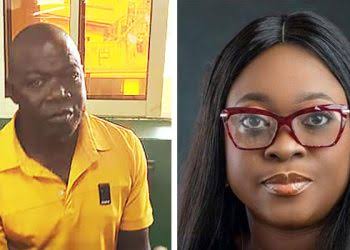ASP Vandi also threatened to shoot me after killing Bolanle Raheem, sister, Titilayo Enemah tells court
Titilayo Enemah, sister of Bolanle Raheem, testified in the trial of Drambi Vandi on Thursday.
Raheem, a female lawyer, was allegedly shot dead by Vandi, the suspended assistant superintendent of police (ASP), on December 25, 2022.
Enemah appeared before Ibironke Harrison, the presiding judge of a Lagos high court, as the fourth witness in the murder trial.
During her testimony, Enemah told the court that the defendant asked the car to stop and pointed the gun towards where her sister was seated.
She said the deceased shouted her husband’s name after the bullet hit her.
“I was looking at the police officer who said stop and I saw him(the defendant) pointing the gun. We had passed the other officer who initially asked us to stop,” she said.
“I saw him carrying the gun, and immediately we heard a sound. I thought he used the gun to hit the side window. Immediately, my sister shouted and said, ‘Gbenga, the bullet has entered my chest’. She said it again. Her neck just dropped and she closed her eyes.
“I called her, ‘Mummy Semilore’. Immediately, I ran out of the vehicle to the police officer and said ‘you just shot at my sister’. This police officer pointed the gun at me, saying ‘I will shoot you’.
“He is the one who shot my sister and he still pointed the gun at me when I held him.”
Enemah said some boys around the area asked her to hold on to the police officer.
“After he threatened me, I was scared. Immediately, I saw two boys coming to the scene,” she said.
“Ordinarily, that place is always busy but that day there were no boys around. I saw two boys. They said, ‘hold him very well’.
“That gave me the courage. Immediately, I dragged him and told him to sit near my sister in the front seat.
“He wanted to enter the patrol van, I dragged him and said you won’t go because you just shot my sister.”
During cross-examination, Odutola Adetokunbo, counsel to the defendant, asked Enemah to confirm whether she wrote a statement at the police station on the day of the incident.
“They were asking me to tell them what happened but I did not write the statement with my hand,” she responded.
“Do you sign the statement,” the counsel asked.
“Yes, I signed it,” she responded.
“Do you see any of the police officers pulling the trigger?” the counsel asked.
“The only person I saw was him(the defendant). He was carrying a gun. The bullet came out from the gun and hit my sister,” she said.
“Did you see the bullet?” the counsel asked.
“He(the defendant) was the one holding the gun and facing her,” she said.
“Did the defendant shoot that gun?” the counsel queried.
“I know that he was the one holding the gun and facing us with that same gun. Definitely, he was the one that shot the gun. He was the one,” she responded.
“Why did you find it difficult to put that in your statement?” the counsel asked.
“I wasn’t myself the day that incident happened,” she said.
“Is it because you were not yourself that you couldn’t notice who shot the gun?” the counsel queried.
“At the police station, When the DPO asked him who shot, he could not say anything. My children told me that he said at the police station— what have I done?” she responded.
“All the witnesses that had appeared before did not say the defendant shot,” the counsel retorted.
“I know what I saw that day. I couldn’t have seen other police officers and I still went straight to drag him. He was the one who I saw and I grabbed him.”
After the cross-examination, the judge adjourned the case to February 1 and 2.





















